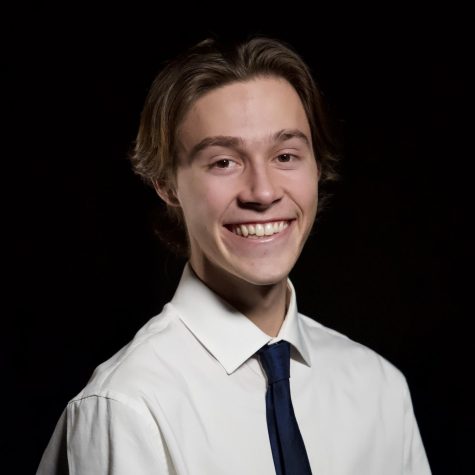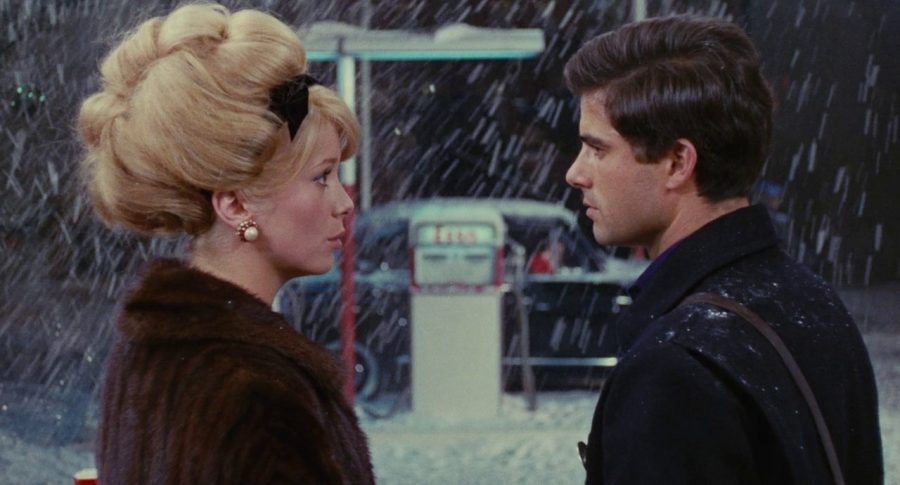With the oversaturation of mediocre content on streaming services, it can be hard to find films of substance. Kanopy, which all UCSD students have access to for free through the library, relieves this issue. This week, we will look at Jacques Demy’s “Les Parapluies de Cherbourg” (The Umbrellas of Cherbourg)
In “Les Parapluies de Cherbourg,” Demy gracefully paints a story of young love and loss through heartbreaking melodies and pastel backgrounds. The film follows Geneviève (Catherine Deneuve), a young woman working at her mother’s umbrella shop, as she encounters her first entanglement with love.
The film opens with a melancholic theme composed by Michel Legrand while the residents of Cherbourg open their umbrellas to shield themselves from the downpour. The credits fade in and out until Demy’s name appears onscreen and the music quickly transitions to an upbeat and jazzy tune that introduces Geneviève’s love, Guy (Nino Castelnuovo), working in an auto shop. A customer asks — sings — if his car is finished and Guy responds — likewise in song. Demy establishes the crux of the film within this first scene — there is not a word of dialogue that is spoken, it is a film entirely composed of song. As Guy chats to his co-workers about his plans for the afternoon, one exclaims that he likes cinema better; “All that singing pains me!” With this self-referencing line, Demy has described the entwining of cinema and theater into one medium which is to be “Les Parapluies de Cherbourg.”
After some lovely sequences of romance between Geneviève and Guy, the true substance of the film is presented. Geneviève’s mother (played by Anne Vernon), whose shop is doing poorly, disapproves of her infatuation with Guy, saying she is too young and Guy too poor. This conflict comes to a head when Guy must complete his mandatory military service in Algeria, meaning the pair will be apart for two years. They part in a particularly devastating sequence, promising to wait for each other, while Geneviève’s mother is relieved. By chance, Geneviève and her mother encounter Roland Cassard (Marc Michel), a wealthy man who is enamored by Geneviève. The most powerful shot of the film occurs when they dine together, and after finding the lucky charm in her King’s cake Geneviève must, according to tradition, choose a king. She says she doesn’t have a choice, that Roland is her king. She is given a crown to wear, and staring directly into the camera, where Roland would be sitting, forces a weak smile. In this scene, the profound themes of the film — those of young love, of separation, of class, of single-motherhood, are most clear.
This film is clearly the work of an “auteur;” a director who takes full control of the film, often despite the constraints of production companies. Every minute detail of the film feels intentional. The singing dialogue, restrained by the necessity for rhyme and rhythm, is deliberately written. The characters’ costumes match the wallpapers and backgrounds of the various locations. Roland Cassard references a romantic plight which is the subject of Demy’s earlier film “Lola.” His unique direction is not contained to “Les Parapluies,” he has created his own cinematic world of characters, who overlap through different films.
Released during the era of, though not necessarily being in, the French New Wave of the 1960s, those who enjoy this film have an incredible selection of films to further delve into — a large number of which are on Kanopy. The most similar of course being Demy’s “Lola” — which follows Roland Cassard — and “The Young Girls of Rochefort,” in which Catherine Deneuve again stars. A few others that seem particularly relevant are those directed by Demy’s wife, Agnes Varda, who was one of the most influential filmmakers at the time. Many of her films are streaming on Kanopy, with the most notable being “Cleo From 5 to 7,” which features a score by Michel Legrand, and cameos by Jean-Luc Godard and Anna Karina.
There are certainly parallels to be drawn between “Les Parapluies” and “La La Land” (2016), although to take this comparison too far would be a mistake. I link them to provide an avenue of comparison with a contemporary American film. Both follow the tale of two lovers and the heartbreak they endure while being separated, and both rely on musical numbers. Those who enjoyed “La La Land” will certainly enjoy “Les Parapluies,” and for those who didn’t enjoy “La La Land,” I implore you to give “Les Parapluies” a chance. As grand as “La La Land” is, it pales in comparison to “Les Parapluies.” While both share the depiction of love, “La La Land” restrains itself to an ode to Hollywood, while “Les Parapluies” allows itself to be an ode to love.
Image courtesy of An0ther Magazine
Matthew’s Video Store: Jacques Demy’s “Les Parapluies de Cherbourg”
May 8, 2022
1
0
About the Contributor

Matthew Risley, Senior Staff Writer
I mostly write about film. Some of my favorite directors are Jean-Luc Godard, Wong Kar-wai, Tsai Ming-liang, and Andrei Tarkovsky.
More to Discover










Rebecca • May 8, 2022 at 10:25 pm
Great review and job well done, would love to see this guy’s work in the print!